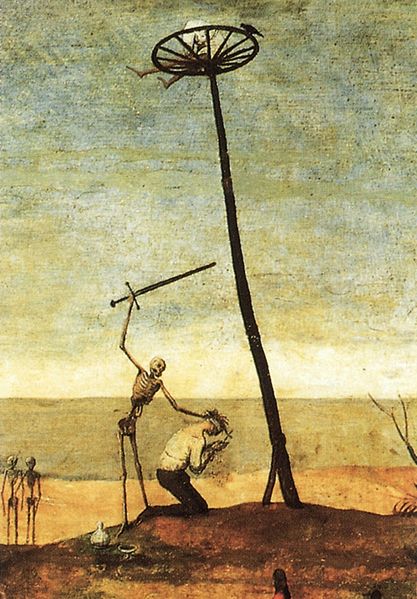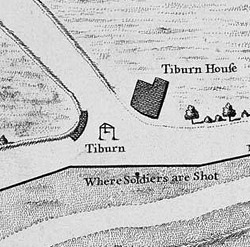|
Paskah Rose
Paskah Rose (died 28 May 1686), also known as Pascha Rose, was an English executioner briefly during 1686, successor to Jack Ketch. Rose was a butcher by trade. He had been Ketch's assistant during the period of the Bloody Assizes. When Ketch was imprisoned for "affronting" a London sheriff, Rose was appointed in his place. A few months after taking over Rose was arrested for robbery, after he and another man had broken into the house of a William Barnet and stolen "a Cambler coat and other apparrel".James Bland, ''The common hangman: English and Scottish hangmen before the abolition of public executions'', Henry Publications, 1984, p.159. He was hanged at Tyburn on 28 May 1686, following which Ketch was reinstated for the remaining few months of his life. References Notes Bibliography * Further reading * Year of birth missing 1686 deaths English executioners Executed English people People executed by Stuart England People executed by the Kingdom of England by ... [...More Info...] [...Related Items...] OR: [Wikipedia] [Google] [Baidu] |
Executioner
An executioner, also known as a hangman or headsman, is an official who executes a sentence of capital punishment on a legally condemned person. Scope and job The executioner was usually presented with a warrant authorising or ordering him to ''execute'' the sentence. The warrant protects the executioner from the charge of murder. Common terms for executioners derived from forms of capital punishment—though they often also performed other physical punishments—include hangman (hanging) and headsman (beheading). In the military, the role of executioner was performed by a soldier, such as the ''provost''. A common stereotype of an executioner is a hooded medieval or absolutist executioner. Symbolic or real, executioners were rarely hooded, and not robed in all black; hoods were only used if an executioner's identity and anonymity were to be preserved from the public. As Hilary Mantel noted in her 2018 Reith Lectures, "Why would an executioner wear a mask? Everybody k ... [...More Info...] [...Related Items...] OR: [Wikipedia] [Google] [Baidu] |
Jack Ketch
John Ketch (died November 1686), generally known as Jack Ketch, was an infamous English executioner employed by King Charles II. He became famous through the way he performed his duties during the tumults of the 1680s, when he was often mentioned in broadsheet accounts that circulated throughout the Kingdom of England. He is thought to have been appointed in 1663. He executed the death sentences against William Russell, Lord Russell, in Lincoln's Inn Fields on 21 July 1683, and James Scott, 1st Duke of Monmouth, on 15 July 1685, after the Monmouth Rebellion. Ketch's notoriety stems from "barbarity at the execution of Lord Russell, the Duke of Monmouth, and other political offenders". Because of his botched executions, the name "Jack Ketch" is used as a proverbial name for death, Satan and executioners. Appointment Ketch took office in 1663, succeeding the late Edward Dun, to whom he had been apprenticed. He is first mentioned in the Proceedings of the Old Bailey for 14 Januar ... [...More Info...] [...Related Items...] OR: [Wikipedia] [Google] [Baidu] |
Bloody Assizes
The Bloody Assizes were a series of trials started at Winchester on 25 August 1685 in the aftermath of the Battle of Sedgemoor, which ended the Monmouth Rebellion in England. History There were five judges: Sir William Montague (Lord Chief Baron of the Exchequer), Sir Robert Wright, Sir Francis Wythens (Justice of the King's Bench), Sir Creswell Levinz (Justice of the Common Pleas) and Sir Henry Pollexfen, led by Lord Chief Justice George Jeffreys. Over 1,000 rebels were in prison awaiting the trials, which started in the Great Hall of Winchester Castle in Winchester on 26 August. The first notable trial was that of an elderly gentlewoman named Dame Alice Lisle. The jury reluctantly found her guilty and, the law recognising no distinction between principals and accessories in treason, she was sentenced to be burned. This was commuted to beheading, with the sentence being carried out in Winchester market-place on 2 September 1685. From Winchester the court proceeded th ... [...More Info...] [...Related Items...] OR: [Wikipedia] [Google] [Baidu] |
Tyburn
Tyburn was a manor (estate) in the county of Middlesex, one of two which were served by the parish of Marylebone. The parish, probably therefore also the manor, was bounded by Roman roads to the west (modern Edgware Road) and south (modern Oxford Street), the junction of these was the site of the famous Tyburn Gallows (known colloquially as the "Tyburn Tree"), now occupied by Marble Arch. For this reason, for many centuries, the name Tyburn was synonymous with capital punishment, it having been the principal place for execution of London criminals and convicted traitors, including many religious martyrs. It was also known as 'God's Tribunal', in the 18th century. Tyburn took its name from the Tyburn Brook, a tributary of the River Westbourne. The name Tyburn, from Teo Bourne, means 'boundary stream',Gover, J. E. B., Allen Mawer and F. M. Stenton ''The Place-Names of Middlesex''. Nottingham: English Place-Name Society, The, 1942: 6. but Tyburn Brook should not be confused with ... [...More Info...] [...Related Items...] OR: [Wikipedia] [Google] [Baidu] |
Year Of Birth Missing
A year or annus is the orbital period of a planetary body, for example, the Earth, moving in its orbit around the Sun. Due to the Earth's axial tilt, the course of a year sees the passing of the seasons, marked by change in weather, the hours of daylight, and, consequently, vegetation and soil fertility. In temperate and subpolar regions around the planet, four seasons are generally recognized: spring, summer, autumn and winter. In tropical and subtropical regions, several geographical sectors do not present defined seasons; but in the seasonal tropics, the annual wet and dry seasons are recognized and tracked. A calendar year is an approximation of the number of days of the Earth's orbital period, as counted in a given calendar. The Gregorian calendar, or modern calendar, presents its calendar year to be either a common year of 365 days or a leap year of 366 days, as do the Julian calendars. For the Gregorian calendar, the average length of the calendar ... [...More Info...] [...Related Items...] OR: [Wikipedia] [Google] [Baidu] |
1686 Deaths
Events January–March * January 3 – In Madras (now Chennai) in India, local residents employed by the East India Company threaten to boycott their jobs after corporate administrator William Gyfford imposes a house tax on residences within the city walls. Gyfford places security forces at all entrances to the city and threatens to banish anyone who fails to pay their taxes, as well as to confiscate the goods of merchants who refuse to make sales. A compromise is reached the next day on the amount of the taxes. * January 17 – King Louis XIV of France reports the success of the Edict of Fontainebleau, issued on October 22 against the Protestant Huguenots, and reports that after less than three months, the vast majority of the Huguenot population had left the country. * January 29 – In Guatemala, Spanish Army Captain Melchor Rodríguez Mazariegos leads a campaign to conquer the indigenous Maya people in the rain forests of Lacandona, departing f ... [...More Info...] [...Related Items...] OR: [Wikipedia] [Google] [Baidu] |
English Executioners
English usually refers to: * English language * English people English may also refer to: Peoples, culture, and language * ''English'', an adjective for something of, from, or related to England ** English national identity, an identity and common culture ** English language in England, a variant of the English language spoken in England * English languages (other) * English studies, the study of English language and literature * ''English'', an Amish term for non-Amish, regardless of ethnicity Individuals * English (surname), a list of notable people with the surname ''English'' * People with the given name ** English McConnell (1882–1928), Irish footballer ** English Fisher (1928–2011), American boxing coach ** English Gardner (b. 1992), American track and field sprinter Places United States * English, Indiana, a town * English, Kentucky, an unincorporated community * English, Brazoria County, Texas, an unincorporated community * En ... [...More Info...] [...Related Items...] OR: [Wikipedia] [Google] [Baidu] |
Executed English People
Capital punishment, also known as the death penalty, is the state-sanctioned practice of deliberately killing a person as a punishment for an actual or supposed crime, usually following an authorized, rule-governed process to conclude that the person is responsible for violating norms that warrant said punishment. The sentence ordering that an offender is to be punished in such a manner is known as a death sentence, and the act of carrying out the sentence is known as an execution. A prisoner who has been sentenced to death and awaits execution is ''condemned'' and is commonly referred to as being "on death row". Crimes that are punishable by death are known as ''capital crimes'', ''capital offences'', or ''capital felonies'', and vary depending on the jurisdiction, but commonly include serious crimes against the person, such as murder, mass murder, aggravated cases of rape (often including child sexual abuse), terrorism, aircraft hijacking, war crimes, crimes against hu ... [...More Info...] [...Related Items...] OR: [Wikipedia] [Google] [Baidu] |
People Executed By Stuart England
A person ( : people) is a being that has certain capacities or attributes such as reason, morality, consciousness or self-consciousness, and being a part of a culturally established form of social relations such as kinship, ownership of property, or legal responsibility. The defining features of personhood and, consequently, what makes a person count as a person, differ widely among cultures and contexts. In addition to the question of personhood, of what makes a being count as a person to begin with, there are further questions about personal identity and self: both about what makes any particular person that particular person instead of another, and about what makes a person at one time the same person as they were or will be at another time despite any intervening changes. The plural form "people" is often used to refer to an entire nation or ethnic group (as in "a people"), and this was the original meaning of the word; it subsequently acquired its use as a plural form of ... [...More Info...] [...Related Items...] OR: [Wikipedia] [Google] [Baidu] |
People Executed By The Kingdom Of England By Hanging
A person ( : people) is a being that has certain capacities or attributes such as reason, morality, consciousness or self-consciousness, and being a part of a culturally established form of social relations such as kinship, ownership of property, or legal responsibility. The defining features of personhood and, consequently, what makes a person count as a person, differ widely among cultures and contexts. In addition to the question of personhood, of what makes a being count as a person to begin with, there are further questions about personal identity and self: both about what makes any particular person that particular person instead of another, and about what makes a person at one time the same person as they were or will be at another time despite any intervening changes. The plural form "people" is often used to refer to an entire nation or ethnic group (as in "a people"), and this was the original meaning of the word; it subsequently acquired its use as a plural form of pe ... [...More Info...] [...Related Items...] OR: [Wikipedia] [Google] [Baidu] |






_1938.jpg)